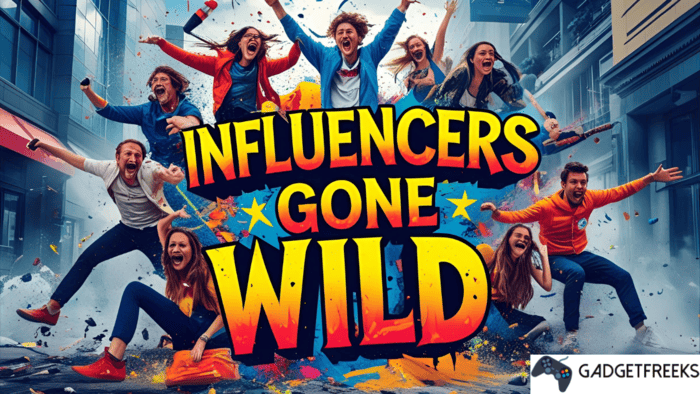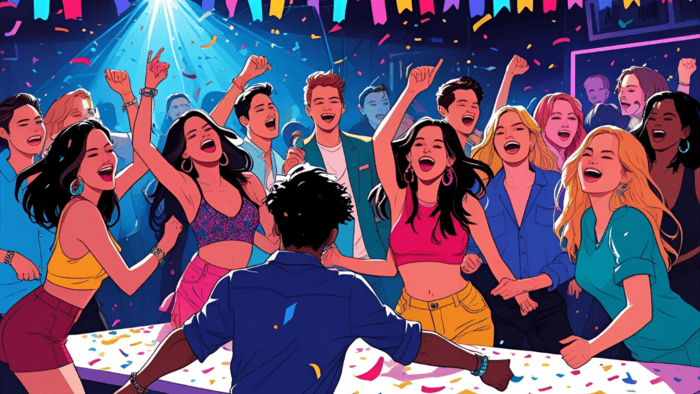Influencers gone wild has become a defining trend in modern social media culture.
This phenomenon describes content creators who push boundaries, engage in controversial behavior, and prioritize viral fame over ethical considerations.
Social media platforms like Instagram, TikTok, and YouTube have created unprecedented opportunities for ordinary people to achieve global fame overnight.
However, this accessibility has also given rise to a troubling reality where some influencers will do anything for attention.

What Does “Influencers Gone Wild” Really Mean?
The term influencers gonewild encompasses various forms of extreme behavior exhibited by social media personalities. These actions typically involve:
- Dangerous stunts and reckless pranks
- Fraudulent activities targeting followers
- Public meltdowns and controversial statements
- Exploitation of personal relationships for views
- Cultural appropriation and offensive content
Types of Wild Influencer Behavior
Dangerous Pranks and Reckless Stunts
Many influencers have resorted to increasingly risky behavior to capture audience attention.
These dangerous activities often blur the line between entertainment and criminal activity.
Notable examples include:
- Fake emergency situations causing public panic
- Extreme driving stunts and illegal street racing
- Participation in harmful viral challenges
The “Benadryl Challenge” on TikTok exemplifies how influencers gone wild can have deadly consequences, leading to hospitalizations and even deaths among young participants.
Financial Fraud and Cryptocurrency Scams
Trust exploitation has become rampant in the influencer space. Many creators use their platforms to promote fraudulent schemes:
- Pump-and-dump crypto scams: Influencers promote investments before dumping their holdings
- Fake giveaways: Promising luxury items without delivery
- Drop-shipping scandals: Selling poor-quality products at inflated prices
The Federal Trade Commission has increased enforcement against deceptive influencer marketing practices.
Public Meltdowns and Social Media Feuds
The pressure of constant public scrutiny often leads to emotional breakdowns. Influencers gonewild frequently involves:
- Live-stream emotional outbursts
- Public feuds with other creators
- Angry responses to criticism
- Legal threats against critics
The Algorithm’s Role in Promoting Wild Behavior
Social media algorithms reward engagement above all else. Controversial and shocking content typically generates more:
- Comments and shares
- Extended viewing time
- User interaction
This system incentivizes influencers gone wild behavior by prioritizing sensational content in recommendation feeds.
Serious Consequences of Going Wild

Financial and Legal Repercussions
Influencers who cross ethical lines face severe consequences:
- Loss of sponsorships: Brands quickly distance themselves from controversy
- Legal action: Lawsuits, fines, and potential criminal charges
- Platform bans: Permanent removal from social media platforms
- Career destruction: Long-term damage to professional opportunities
Mental Health Impact
The constant pressure to maintain relevance takes a psychological toll. Many influencers gone wild struggle with:
- Anxiety and depression
- Burnout from content creation pressure
- Isolation despite public fame
- Identity issues beyond their online persona
The Dark Side of Brand Partnerships
The relationship between influencers gonewild and brand collaborations creates ethical dilemmas:
Pressure to Promote Questionable Products
Influencers often feel compelled to endorse products they don’t believe in to maintain income streams. This pressure can lead to:
- False product claims and exaggerated benefits
- Hidden sponsorship disclosures
- Exploitation of audience trust for financial gain
Brand Exploitation
Companies may exploit influencer platforms while abandoning creators during controversies, leaving influencers without support when they need it most.
Impact on Younger Audiences
Influencers gone wild particularly affects teen and young adult followers who are more susceptible to:
- Unrealistic beauty standards promoted through filters
- Materialism and overspending encouraged by lifestyle content
- Participation in dangerous viral challenges
- Normalized controversial behavior
Educational institutions and parents increasingly express concern about social media’s influence on impressionable minds.
Psychology Behind Wild Influencer Behavior
Attention-Seeking Motivations
The psychology driving influencers gonewild includes:
- Desperate need for validation through engagement metrics
- Fear of becoming irrelevant in oversaturated markets
- Addiction to the dopamine rush from viral content
- Competitive pressure from other creators
Fear of Missing Out (FOMO)
FOMO significantly influences influencer behavior, driving creators to:
- Participate in every trending challenge
- Showcase increasingly extravagant lifestyles
- Take greater risks for social media content
- Constantly compare themselves to competitors
Can Influencers Recover from Scandals?

Recovery from influencers gone wild incidents is possible but challenging. Successful redemption typically requires:
- Genuine public apologies acknowledging wrongdoing
- Taking concrete steps to address underlying issues
- Consistent demonstration of improved behavior over time
- Professional help for mental health or addiction issues
Some influencers have successfully rebuilt their careers through authentic personal growth and transparency about their mistakes.
The Future of Influencer Accountability
As audiences become more aware of manipulative tactics, several trends are emerging:
Stronger Platform Policies
Social media companies are implementing stricter regulations regarding:
- Misleading content and false advertising
- Disclosure requirements for sponsored content
- Consequences for dangerous or harmful behavior
Legal Frameworks
Governments worldwide are introducing laws requiring:
- Clear disclosure of paid partnerships
- Accountability for fraudulent promotions
- Consumer protection against influencer scams
The Federal Communications Commission and similar international bodies are developing comprehensive guidelines for digital marketing.
Consumer Education
Growing awareness campaigns help audiences:
- Critically evaluate influencer recommendations
- Recognize manipulation tactics
- Understand the commercial nature of social media content
Building a Healthier Influencer Culture
Support Networks for Creators
Creating safe spaces for influencers includes:
- Mental health resources and counseling
- Peer support groups for industry professionals
- Mentorship programs for new creators
- Education about ethical content creation
Encouraging Positive Influence
The future of social media depends on promoting:
- Authentic storytelling over manufactured drama
- Educational and inspiring content
- Responsible brand partnerships
- Community building rather than exploitation
Protecting Yourself from Influencer Manipulation
Red Flags to Watch For
Be cautious of influencers gone wild who:
- Make unrealistic promises about products or investments
- Refuse to disclose sponsored content clearly
- Promote get-rich-quick schemes or questionable investments
- Display erratic or concerning behavior patterns
Research and Verification
Always:
- Independently research product claims and reviews
- Check influencer track records and past controversies
- Consult multiple sources before making purchasing decisions
- Report suspicious or fraudulent activity to relevant authorities
The Role of Brands in Responsible Influencer Marketing
Companies must take responsibility by:
- Thoroughly vetting potential influencer partners
- Establishing clear ethical guidelines for collaborations
- Supporting creators during controversies when appropriate
- Promoting authentic rather than manufactured content
The Future of Social Media Influence
The influencers gone wild phenomenon reveals both the potential and pitfalls of digital fame.
While some creators have used their platforms for positive impact, others have demonstrated the dark side of unchecked influence.
Moving forward, the industry must prioritize:
- Ethical content creation practices
- Mental health support for creators
- Transparent business relationships
- Protection of vulnerable audiences
The future of influencer marketing depends on learning from past mistakes and building a more sustainable, responsible ecosystem that benefits creators, brands, and audiences alike.
As social media continues evolving, the lessons learned from influencers gonewild incidents will shape policies, practices, and cultural norms for digital content creation.
Remember: Always approach influencer content with critical thinking and maintain healthy skepticism about too-good-to-be-true claims or promises.
